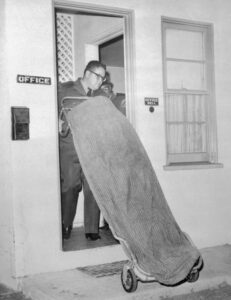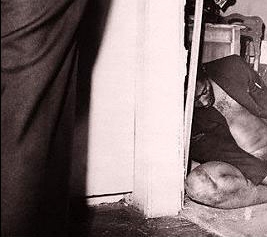The Tragic End Of A Soul Legend: Unraveling The Mystery Of Sam Cooke's Death
Sam Cooke, a name synonymous with soul music, was more than just a singer; he was a trailblazer whose velvety voice and poignant lyrics shaped an entire genre. From his humble beginnings as a gospel singer, the son of a Baptist minister, Cooke’s destiny was always to captivate an audience. His brother, L.C., fondly recalled a seven-year-old Cooke lining up popsicle sticks, declaring, “This is my audience, see? I’m gonna sing to these sticks.” This early craving for an audience blossomed into a career that produced timeless hits like "A Change Is Gonna Come" and "Wonderful World." Yet, the story of Sam Cooke is not solely one of musical triumph; it is also shrouded in the enduring mystery of his untimely and violent death at the age of 33, a tragedy that unfolded at the Hacienda Motel in Los Angeles and continues to spark debate decades later.
The Rise of a Soul Icon
From Gospel to Stardom
Born in Clarksdale, Mississippi, and raised in Chicago, Sam Cooke’s musical journey began in the church. As the son of a Baptist minister, gospel music was his first language, and he quickly became a prominent figure in the gospel group The Soul Stirrers. His voice, smooth and rich, resonated deeply with listeners, laying the groundwork for his eventual crossover into secular music. This transition, while controversial among some of his gospel fans, was inevitable for a talent as ambitious and expansive as Cooke's. He yearned for a broader platform, a desire that was evident even in his childhood games. His move into pop and R&B was met with immense success, propelling him to superstardom and cementing his status as one of the most important soul artists of all time. He wasn't just a singer; he was a businessman, an advocate, and a cultural force, breaking down barriers and inspiring millions.
The Fateful Night: December 11, 1964
The Hacienda Motel Incident
The night of December 11, 1964, would forever be etched in music history as the moment the world lost Sam Cooke. The location was the Hacienda Motel, situated at 91st and South Figueroa streets in South Central Los Angeles – a site now known as the Star Motel. In the early hours of that morning, police were dispatched to the motel in response to two separate, alarming reports: a shooting and a kidnapping. This dual nature of the initial call immediately set a perplexing tone for the events that followed, hinting at a more complex narrative than what would eventually become the official story.
- Lotus Caffeine Amount
- Chantelle Luttenberger
- Medellin Pride 2024
- Carboxiterapia Antes Y Despues
- Malcolm Cunningham Net Worth
The Discovery of Sam Cooke's Body
Upon arrival, officers of the Los Angeles Police Department made a grim discovery. They found Sam Cooke’s lifeless body. He was just 33 years old. The scene was shocking; Cooke was clad only in a sports jacket, a detail that added to the unsettling nature of his demise. He had sustained a severe gunshot wound to the chest, which was later determined to have pierced his heart. Some reports even indicate he was shot three times in the chest. The official account from the police stated that Cooke was shot and killed by the manager of the motel, Bertha Franklin, when he allegedly kicked in a door. The removal of his body from the office of the Hacienda Motel marked the beginning of a long and contentious period of speculation and grief for his legions of fans.
The Official Narrative vs. Lingering Questions
The Manager's Account
Bertha Franklin, the motel manager, testified in court about the events leading to Cooke's death. Her account painted a picture of a violent altercation, claiming that Cooke had become enraged and had broken into her office. She stated that she shot him in self-defense. Another individual, Elisa Boyer, who was with Cooke earlier that night, also provided testimony. Boyer claimed that Cooke "dragged" her into the bedroom. Franklin, in her testimony, further elaborated on the alleged confrontation, stating that Cooke "grabbed both of my arms and started twisting ’em and asked me where was the girl." This narrative was presented as the official explanation for the shooting, leading to the ruling that Cooke's death was a justifiable homicide.
The Unsettling Discrepancies
Despite the official ruling, the circumstances surrounding Sam Cooke’s death have remained shrouded in mystery and suspicion for decades. Many, including those close to Cooke, found the official story deeply unsatisfying. One of the most vocal critics was legendary singer Etta James, who saw Cooke’s body before his funeral. James noted that the injuries he suffered didn’t match the “official” version of events. She later wrote that he appeared to have sustained significant facial bruises, suggesting a severe beating, possibly from a broomstick whipping by Bertha Franklin, as some mourners also pointed out facial bruises from a broomstick. The presence of these injuries, seemingly inconsistent with a simple self-defense shooting, fueled suspicions that the full truth was not being told.
Furthermore, the initial police response to both a shooting and a kidnapping report adds another layer of complexity. If Cooke was the aggressor, as the official story suggests, what was the nature of the kidnapping report? The racial tensions prevalent in the United States in 1964 also provide a crucial backdrop to the skepticism surrounding the investigation. In an era where justice for Black individuals was often elusive, many questioned whether the investigation into Cooke's death was thorough and unbiased. The fact that he was a wealthy and influential Black man, operating in a segregated society, only deepened the distrust.
The lingering questions about Sam Cooke’s final moments – the exact sequence of events, the extent of his injuries, and the true motivations of all parties involved – have never been fully resolved to the satisfaction of his fans and many historians. His death is often described as "untimely and mysterious," a "murdered in suspicious circumstances" event, rather than a clear-cut case of justifiable homicide.
The Legacy Beyond Death
Despite his tragic and enigmatic passing, Sam Cooke left an everlasting mark on music and culture. His songs continue to inspire, provoke thought, and move generations. Had he lived, Sam Cooke would have turned 90 years old in January 2021. His murder at 33 robbed the world of decades more of his genius, but it could not erase the profound impact of the work he had already created. The mystery of his death, rather than overshadowing his legacy, has in some ways only amplified the poignant power of his music, particularly "A Change Is Gonna Come," a song that resonates with themes of struggle, hope, and an enduring quest for justice.
Summary
Sam Cooke, a seminal figure in soul music, met a tragic and mysterious end on December 11, 1964, at the Hacienda Motel in Los Angeles. Discovered by police responding to reports of both a shooting and a kidnapping, Cooke's body bore a fatal gunshot wound to the chest. While the official account, provided by motel manager Bertha Franklin, claimed self-defense against an aggressive Cooke, numerous discrepancies and eyewitness accounts, notably from Etta James, suggested a more violent and complicated scenario, including evidence of a severe beating. These inconsistencies, coupled with the racial climate of the era, have fueled decades of speculation, ensuring that the circumstances surrounding the discovery of Sam Cooke's dead body and his final moments remain one of music history's most enduring and unsettling mysteries. His immense musical legacy, however, continues to shine brightly, undimmed by the shadows of his untimely demise.

Sam Cooke's Death And The Mystery Surrounding It

December 11th in Rock & Roll History - Streamingoldies

31 Photos from Celebrity Open Casket Funerals ~ SAM COOKE, 1964, Age 33